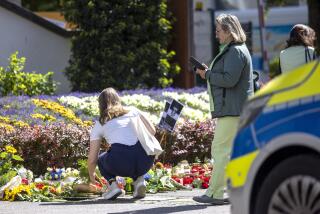Turkish Marchers in Germany Protest Fatal Arson Attacks : Europe: Demonstrators in western industrial city shout âNazis out!â Germans later hold a prayer vigil.
SOLINGEN, Germany â Emotions ran high in this western industrial city Sunday as thousands of Turks took to the streets for the second day in the wake of the worst attack against foreign residents in Germany since World War II.
An estimated 3,000 to 5,000 mainly Turkish protesters marched through the city center shouting âNazis out! Nazis out!â and carrying signs denouncing the incident that claimed the lives of five Turkish nationals, injured three others and left many Germans wondering where their nation is headed.
Three children, aged 4, 9 and 13, were among the dead.
At one point, the demonstration threatened to erupt into violence after a German youth threw a soft drink can into the crowd from an apartment window, but after several minutes of scuffling, police and older Turks kept younger protesters from storming the building.
Shortly afterward, a Turkish youth fired several rounds from an air pistol into the sky.
Politicians, shouted down by angry protesters Saturday as they tried to address the crowd, did not appear in the city Sunday.
While some mainly younger Germans marched with the procession, most German citizens either watched quietly from a distance or stayed away.
More than 1,000 later held a prayer vigil in front of the charred remains of the house where the five died.
The house and its surroundings underscored the reality that in Germany, the deadly assaults against foreigners are not occurring in lawless, unruly inner-city ghettos but in tidy, middle-class neighborhoods.
Much as in a similar attack that claimed three Turkish lives in the town of Moelln last November, the victims in Solingen lived on a quiet, well-groomed street.
Here at the scene of the crime, an even mix of Turks and Germans of all ages seemed to genuinely share grief.
A middle-aged German man was applauded after making a spontaneous plea for solidarity. A Turkish man who became hysterical was embraced by a German woman who also began sobbing.
But amid the emotion and the ashes of the three-story house, several unsettling facts were hard to overlook.
Among them:
* The attack that stunned so much of the country was no bolt from the blue for those who live here.
Both Turks and Germans in the town recalled clashes in recent months between Turkish youths and German skinheads.
About a month ago, right-wing youths broke into a Turkish cafe shortly after closing time, causing moderate damage. Turkish youths said they have repeatedly been the targets of racial slurs from German youths.
A small park behind the burned-out house was a well-known meeting place for skinhead youths, and neighborhood residents said a carload of skinheads had stopped in front of the Turkish home on the eve of the attack but drove away after police were called.
* A hardening xenophobia that Turks say they have felt, coupled with recent brutal attacks, is driving a wedge between Germans and the countryâs largest, best-integrated minority--a fact that carries ominous implications for a nation whose social fabric is already being tested by unification.
Keskin Cemalettin, 28, a welder who has lived his entire adult life in the city, said that four years ago he wasnât sure whether he was Turkish or German. âNow I know what I am: just a dirty foreigner,â he said bitterly.
More than 1.7 million Turks live in Germany, roughly one-third of them in the industrial Ruhr region. They came originally in the early 1960s and are credited with helping create West Germanyâs famed âeconomic miracle.â
âYou greeted us 30 years ago with presents, now you send us home in coffins,â read one sign at Sundayâs protest.
Newspapers in Turkey compared the attacks to Third Reich atrocities, and Prime Minister Erdal Inonu said that if all else fails, Germany should deploy police to guard the homes of all Turkish nationals.
* German political figures appear unable to take the kind of measures required to halt the violence, even though a growing body of evidence shows that most of the attacks against foreigners come from ill-organized bands of disaffected youths whose ideology extends to little beyond slogan-shouting.
Pressed for answers or new proposals during an interview on the Sunday evening TV news, Interior Minister Rudolf Seiters could only lamely repeat his wish that the culprits be quickly caught.
Many argue that attacks against foreigners are encouraged by a broader, more subtle intolerance in German society that political leaders have failed to address for fear of alienating voters.
While the federal prosecutorâs office declined to comment on the investigation, local police authorities said that one 16-year-old local youth had been taken into custody.
Federal Prosector Alexander von Stahl said Saturday that he believed right-wing extremists carried out the attack.
The lack of credible initiatives from men like Seiters is almost certain to strengthen calls by the governmentâs political opponents to give longtime foreign residents easier access to citizenship and the right to vote.
The lack of both those things effectively leaves the Turkish minority politically powerless.
Unless these conditions change, some fear further violence is inevitable.
âFor me, this is just the beginning,â said Cemalettin, nodding toward the burned-out house. âAnd candlelight processions wonât change it.â
More to Read
Sign up for Essential California
The most important California stories and recommendations in your inbox every morning.
You may occasionally receive promotional content from the Los Angeles Times.










